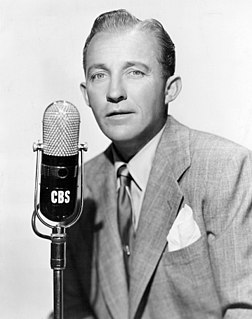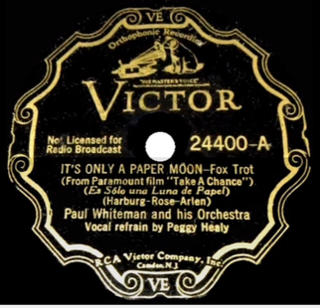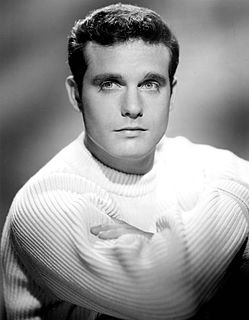Related Research Articles

Harry Lillis "Bing" Crosby Jr. was an American singer, comedian and actor. The first multimedia star, Crosby was a leader in record sales, radio ratings, and motion picture grosses from 1930 to 1954. He made over seventy feature films and recorded more than 1,600 different songs.

Rosemary Clooney was an American singer and actress. She came to prominence in the early 1950s with the song "Come On-a My House", which was followed by other pop numbers such as "Botch-a-Me", "Mambo Italiano", "Tenderly", "Half as Much", "Hey There" and "This Ole House". She also had success as a jazz vocalist. Clooney's career languished in the 1960s, partly due to problems related to depression and drug addiction, but revived in 1977, when her White Christmas co-star Bing Crosby asked her to appear with him at a show marking his 50th anniversary in show business. She continued recording until her death in 2002.
Edwin LeMar "Buddy" Cole, was a jazz pianist, orchestra leader, and composer. He played behind a number of pop singers, including Rosemary Clooney and Bing Crosby.

Lux Video Theatre is an American television anthology series that was produced from 1950 until 1957. The series presented both comedy and drama in original teleplays, as well as abridged adaptations of films and plays.
The Edsel Show is an hour-long television special broadcast live on CBS in the United States on October 13, 1957, intended to promote Ford Motor Company's new Edsel cars. It was a milestone in the long career of entertainer Bing Crosby and is notable as the first CBS entertainment program to be recorded on videotape for rebroadcast in the western part of the country following a live performance for the east coast. Crosby arranged for this ‘live’ program to be ‘produced’ by his alma mater Gonzaga University in order that the profits could go to them in a tax efficient way. The program won the ‘Look’ magazine TV Award for ‘Best Musical Show’ and was nominated for an Emmy as the “Best Single Program of the Year”.

"It's Only a Paper Moon" is a popular song published in 1933 with music by Harold Arlen and lyrics by Yip Harburg and Billy Rose.

"Where the Blue of the Night " was the theme Bing Crosby selected for his radio show. It was recorded in November 1931 with Bennie Krueger and his Orchestra. The song was featured in a Mack Sennett movie short starring Bing Crosby. Crosby recorded the song on several occasions starting with the November 23, 1931 version with Bennie Kruger and his Orchestra. He next recorded it on July 20, 1940 with The Paradise Island Trio. On July 17, 1945 he recorded it with John Scott Trotter and his Orchestra and his final recording was on April 21, 1954 with Buddy Cole and his Trio for his Musical Autobiography set.

Louis Isidore "Buddy" Bregman was an American arranger and conductor.

Some Fine Old Chestnuts was Bing Crosby's second studio album for Decca Records, recorded and released as a 10" LP in 1954.

Bing: A Musical Autobiography was Bing Crosby's fourth Decca vinyl LP, recorded and released in 1954.

New Tricks was Bing Crosby's eighth long-playing album and sixth vinyl LP for Decca Records, originally released in 1957 as number DL-8575.

That Travelin' Two-Beat is a duet album by Bing Crosby and Rosemary Clooney recorded in 1964 and released on Capitol Records in 1965.
"You'd Be So Nice to Come Home To" is a popular song written by Cole Porter for the 1943 film Something to Shout About, where it was introduced by Janet Blair and Don Ameche. The song was nominated for the Academy Award for Best Original Song in 1943 but lost to "You'll Never Know".
"Just You, Just Me" is a song from the 1929 musical film Marianne, composed by Jesse Greer with lyrics by Raymond Klages. It was introduced by Marion Davies and Lawrence Gray. The song has had many revisions after its first appearance and has become a jazz standard, having been recorded instrumentally by Red Norvo, Stan Tracey, Oscar Peterson and Lester Young, Buddy Rich, Artie Shaw, Les Paul, Benny Carter, Buddy Bregman, Tex Beneke, Coleman Hawkins, Harry James, Erroll Garner, Benny Goodman, Earl Hines, Joe Pass, Buddy Tate and Abdullah Ibrahim, Les Brown, Bill Coleman and Duke Ellington.
Singer Rosemary Clooney is known for many songs, including "Come On-a My House", "Botch-a-Me", "Mambo Italiano", "Tenderly", "Half as Much", "Hey There" and "This Ole House". This is a partial discography.
The Bing Crosby – Rosemary Clooney Show commonly referred to as just The Crosby – Clooney Show was an American old-time talk radio program.
This Is Bing Crosby was a fifteen-minute five times a week daytime radio program featuring Bing Crosby acting as a disc jockey. Minute Maid quick frozen concentrated orange juice was promoted on the shows.
The Bing Crosby Show for General Electric was a 30-minute variety old-time radio program starring entertainer Bing Crosby. The series ran on CBS radio from 1952-1954. The series was sponsored by the General Electric company and was usually recorded in Hollywood, although some shows were recorded in Palm Springs. The last seven shows of the first season were broadcast as though they had come from Paris, France but they had actually been recorded in the USA prior to Crosby’s departure for Europe.
The Bing Crosby Show was broadcast daily Mondays to Fridays and was of 15 minutes duration with Bing Crosby talking about all manner of different subjects and usually including three songs around the dialogue.

A Christmas Sing with Bing was a series of transcribed radio hours hosted by Bing Crosby and broadcast on Christmas Eve for eight years. Insurance Company of North America was the sponsor.
References
- 1 2 3 Rullman, Russ. "BING magazine". BING magazine. Retrieved February 14, 2016.
- ↑ Macfarlane, Malcolm. "Bing Crosby - Day by Day". BING magazine. Retrieved February 14, 2016.